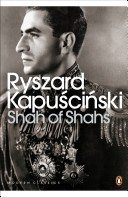I forgot to take a picture of Shah of Shahs before I took it back to the ‘brary, so here’s one I borrowed from the interconnecting tubes.
It’s tiny, but I think you get the point. Ryszard Kapuscinski was a Polish journalist, and his work is the second-most-widely-translated of any of his countrymen. He wrote extensively about Africa, the final hours of the Soviet Union, and, of course, Iran, but he was also a poet of some renown and a somewhat famous photographer in his day. He was also an amateur boxer of note, so that’s something to file away in your RK dossier. I recommend his Wikipedia page, which I linked to up there; a lot of the criticisms and posthumous observations about his work and person fall neatly in line with many of the questions I had about Shah of Shahs.
The basic premise of the book is that it’s an overview of the the last days of the Shah of Iran and the subsequent revolution through the eyes of an outsider. The literary treatments of this time period (House of Sand and Fog, Persepolis) are varied and interesting; in my opinion, the body of work available in English is one of the richest of any foreign conflict. Kapuscinski’s take is no less striking: he uses material artifacts, like photos, cassettes, and newspaper articles and works backward to try and make sense of the trauma and immense cultural shift that occurred very quickly. Sometimes this is striking and interesting, but other times, it makes it hard to know whether you’re reading a non-fiction novel or a longform piece of journalism or something even less fact-based entirely. Is he extrapolating from what he sees and hears? Is he taking his cues from anonymous interviews? Is this all in a book or a newspaper somewhere that he hasn’t cited? I’m not sure.
The strength of this narrative structure, though, is that it’s unsettling and confusing, which mirrors what I must imagine is the sensation of social structure collapsing. It’s disorienting, but if such a thing is possible, it’s disorienting in a good way. It keeps you on your toes, it makes you unsure. There’s a fascinating passage that discusses the secret police coming to the apartment of someone who has just moved back to Iran after studying in medicine France for several years. The world has changed a lot since this man has been away, and he doesn’t seem to fully grasp the new political climate. They go back and forth about whether or not he should join the party of the shah, and ultimately, the police seem to tell him this isn’t really an invitation, but a mandate. At this point, the young doctor has created an impossible situation for himself: if he says he isn’t against the shah, they’ll just say that he wanted to be. The way Kapuscinski writes communicates this bind perfectly; there is no way to win when blind brutality is the way of your world, and you’re constantly mired in confusion as you blindly grope your way through.
After I’d digested what I’d read and started taking a tour of the aforementioned (and completely infallible) Wikipedia page of our author, I found that a lot of people had the same questions I did about his methods and the truthiness of his work. Kapuscinski refused to update future editions of his books when new information came to light, and a significant number of prominent journalists have called into question his adherence to standards and ethics. There was a lot of talk of him both exoticizing and homogenizing his subjects (Africa, Iran, the Soviet Union) for personal gain, and damning statements like this one about his work: “[The Africa he creates] is a fascinating place. Whether it ever existed as he tells it is another matter altogether.” That’s what I came away with from this book about Iran. Did this happen? I’m not sure. The revolution was brutal and terrible, and this book depicts brutal and terrible things (many of which line up with a lot of the non-fiction I’ve read about this time period), but are the people he’s talking about even real? I felt like he never let us get close enough to anyone to even make an educated guess.
Overall, I think he had a novel idea in both the literal and figurative sense of the word. This reads like fiction, and the form is interesting, but I don’t know that this is non-fiction, or that you should read this as your introduction to the Iranian Revolution. I felt like I learned more from Persepolis, which is a graphic novel, than I did here.
Next week, I’m reading this. I’d love to read it with you. If you’ve read Shah of Shahs, let’s talk about it below. If you’ve read other great works about Iran that I didn’t mention, I’d like to hear more.
